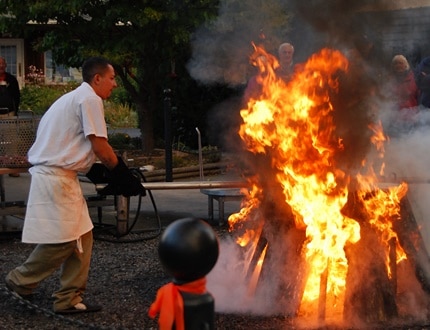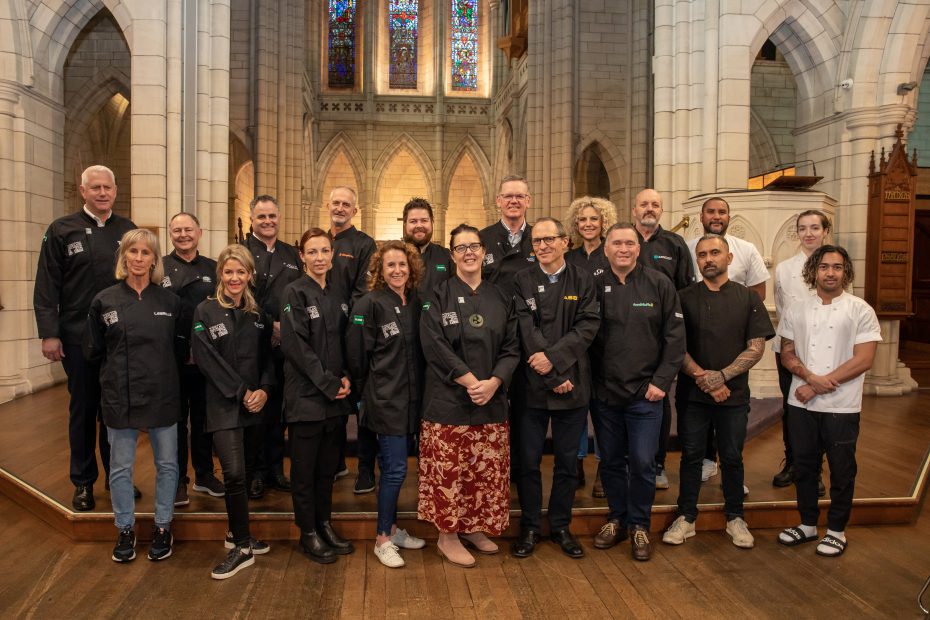Fourteen fire trucks were trying to put down a fire that happened in the Garden Shed bistro in New Zealand in 2018. That is just one of the cases when a fire ruined a good business. It’s a well-known fact that one of the most devastating hazards among restaurant kitchens is the outbreak of a fire.
Not only do restaurant fires cause damage to equipment and the building itself, but these fires can also cause injuries to the restaurant and kitchen workers.
This results in a huge financial hit for the business due to the reparations, business downtime, and sometimes may result in the restaurant closing permanently.
The National Fire Protection Association (NFPA) has estimated that there are roughly 7,640 reported restaurant fires on an annual basis which have resulted in nearly $250 million in property damage. While this is a high number, it does not account for revenue losses and the money lost due to the restaurant being closed either temporarily or permanently.
In a restaurant kitchen, there are lots of fire threats. Open flames, heating equipment, cooking oils, cleaning chemicals, all of them are flammable and contribute to the fire hazards within a kitchen. With the number of flammable substances in a kitchen, it’s no surprise there are as many fires as there are.
Is your restaurant prepared for emergencies? Contact Alsco for a fully-managed Emergency Response Systems and First Aid Supplies.
How You Can Prevent a Restaurant Fire
Given the very nature of cooking, there is no way to completely eliminate the risk of a fire. However, you are able to take a variety of precautions to prevent for fire from breaking out, keep your workers safe, and even ensure first aid supplies in case it happens. With that in mind, here are some steps that can be taken to avoid a restaurant fire as much as possible.
The Necessary Fire Suppression Equipment for a Restaurant Kitchen
Equipment such as situation dependant fire extinguishers and sprinklers in restaurant kitchens are a health and safety requirement in New Zealand nowadays, although their placement and accessibility play an important part in case of a fire. So, what how can you ensure that your fire suppression equipment is up to its best standard?
Tip #1 – Install an Automated Fire Control System.
This first tip is by far the most important. Having an automated fire control system allows for action to be taken the second fire breaks out. This is done by not only cutting off the power to the kitchen but both the gas line and fuel supply, preventing the fire from growing.
Tip #2 – Always Have Backup Equipment.
Fire extinguishers aren’t used regularly, which unfortunately gives the possibility of them not working at the time of use. This is why it’s important to have several backups available in different locations within not only the kitchen but other parts of your restaurant too. To prevent a fire extinguisher not working in the time of need, make sure that you keep them up to date as well as having them serviced on a regular basis.
Tip #3 – Have the Right Equipment Available.
While fire extinguishers and sprinkler installation is important, making sure that you have other things such as fire blankets are equally as important. Make sure that your whole staff team is informed on where all of your fire equipment is located as well as informed on how to react in a fire situation.
Preparing Your Electrical Equipment
While all fires are difficult to deal with, unless they are dealt with at a very early stage, an electric fire is extremely difficult to deal with due to how it spreads fast. One of the most common causes of electrical fires is short-circuiting.
Tip #4 – Regularly Maintain your Electrical Equipment.
This tip accounts for all electrical equipment in your restaurant, not only the kitchen. Your electrical system as a whole should be surveyed regularly, although between surveys you must train your staff on watching out for old or frayed wires which may be a danger, as well as watching for multiple high-voltage appliances plugged into one outlet, which can cause a short circuit fire.
Tip #5 – Rearrange your Kitchen.
The best way to ensure that an electrical fire is prevented is to move potentially dangerous appliances away from one another. For example, if you have your deep fat fryers located next to wall sockets, move the fryer to a different part of your kitchen.
Fire Outbreak: First Response
If your previous preparation failed you and a fire does outbreak, it’s important that you and your staff team know how to react.
Tip #6 – Shut Off the Power.
To stop the fire from spreading and further damaging your restaurant, make sure that there are multiple people trained to deal with shutting off both the electrical power and the fuel supplies, for your kitchen. This will prevent the fire from spreading as well as prevent a potential gas explosion.
Tip #7 – Evacuate your Restaurant.
There must always be an evacuation plan in place. While the fire is most likely in the kitchen, fires can spread quickly so it is important that you get everyone who is in the restaurant, outside of the restaurant. In order to have this done efficiently, there are a few steps that must be considered:
- There must always be an evacuation plan in place, and if changes are made to the restaurant these changes must be accounted for in the plan. This plan should account for the capacity and access points of the restaurant.
- Have staff members who are responsible for the evacuation and are trained to get everyone out of the building efficiently and safely.
- Practice evacuation and fire drills on a regular basis. This will ensure that all of your staff members are fit to deal with the unfortunate situation if it were ever to break out.
TIP#8 – Get Fire Safety Training.
It’s important that your staff are trained in Fire and Warden Training. This will ensure that your staff know how to deal with fire as well as remain calm while doing so.
Tip #9 – Check Out your First Aid Kits Regularly.
It’s important that the first aid kit in the workplace is up to date and the first aid kit supplies are adequate to deal with a variety of situations, one of them being a fire. Make sure that you have multiple first aid kits around your restaurant and make sure that they are properly organised so that an injury is dealt with as soon as possible.
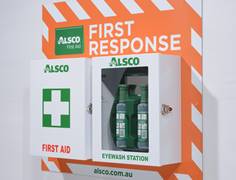
Emergency Response Systems
Ensure your employees are as prepared as possible in an emergency situation.
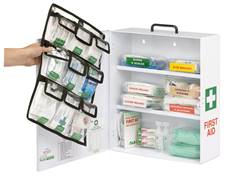
First Aid Kits
Managed first aid kit service keeps your business safe and compliant – year-round.
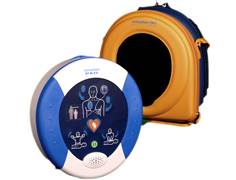
Portable Defibrillators
Ensure your people are capable and prepared as possible when a cardiac emergency strikes.
Find out more about it…
Dealing with Kitchen Grease Properly
Kitchen grease is one of the biggest pains of working in a kitchen. Not only is it dangerous to work with, but if one drip hits the floor, it must be cleaned up immediately and cleaned up properly to ensure that the floor does not become a danger to your workers.
Tip #10 – Clean the Hoods and Vents Regularly.
It’s important to put together a regular cleaning schedule for your deep fat fryers, however, every restaurant schedule will differ depending on many factors. It’s important to ensure that both the fryer and the vents are cleaned regularly in order to ensure that a build-up of grease does not become a fire hazard.
Tip #11 – Ensure that All Parts of the Fryer is in their Correct Places after Cleaning.
If parts are not put back properly, it can result in the fryer not working as efficiently as before and can cause even more of a grease build up in the vents and hood.
Tip #12 – Consult a Professional.
Having a professional inspect your exhaust system will ensure that the deep and harder to reach parts of the fryer system are cleaned efficiently. As well as this, you will be told with confidence if there are certain parts of the system which are not being cleaned as well as they are supposed to be.
Tip #13 – Clean Grease from Around the Whole Kitchen.
Given that in a kitchen you are working with grease regularly, it’s important to clean the whole kitchen every day (or at the very least every other day). Not only is this general health and safety, but it prevents grease from building up in other parts of the kitchen and become a safety hazard.
Tip #14 – Have your Cleaning Rags Cleaned, too.
Remember, grease isn’t the most pleasant thing to work with, and that’s not just the case for in the kitchen. When it comes to cleaning grease out of your cleaning rags it can be a real pain. Have your greasy rags professionally cleaned, too.
It’s The Little Things That Count
While the bigger pointers such as “Make sure at the end of the day, everything is turned off” are important, smaller pointers such as ensuring that your first aid kits are prepared properly are the things that really count when running a business.
Having properly marked exits, efficiently marked first aid kits, and cleaning up spillages. These are the little things that can make or break your business, take care of your business and it will take care of you.
Before the worst strikes your workplace, Send Alsco NZ an enquiry to learn more about our fully-managed Alsco New Zealand Emergency Response Systems and First Aid kits.
